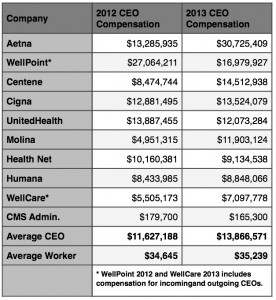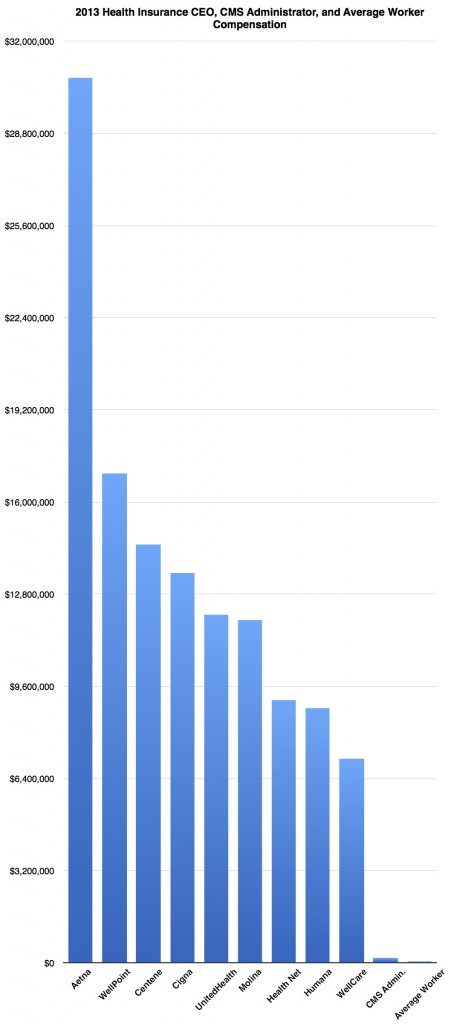Health Insurance CEO Pay Skyrockets in 2013
Some See Their Compensation Double
Chief executive officers at Fortune 500 health insurance companies, who have opposed new regulations under the Affordable Care Act, emerged this month as one of the ACA’s greatest beneficiaries. Recently filed financial reports show that average compensation for these top nine health insurance CEOs rose by more than 19 percent in 2013, while several of the nation’s largest insurers more than doubled CEO pay.
 The biggest winner was Aetna CEO Mark Bertolini, who received a staggering $30.7 million compensation package in 2013. This marks the largest payout to any health insurance executive since passage of the ACA and exceeded the compensation of the next two highest paid health insurer CEOs combined. The Bertolini pay package, which included a large “special one-time performance-based retention award,” represented a 131 percent increase over his $13.3 million compensation in 2012.
The biggest winner was Aetna CEO Mark Bertolini, who received a staggering $30.7 million compensation package in 2013. This marks the largest payout to any health insurance executive since passage of the ACA and exceeded the compensation of the next two highest paid health insurer CEOs combined. The Bertolini pay package, which included a large “special one-time performance-based retention award,” represented a 131 percent increase over his $13.3 million compensation in 2012.
Molina Healthcare and Centene, both Fortune 500 insurers that specialize in privately managed Medicaid plans, roughly doubled CEO compensation in 2013. J. Mario Molina received $11.9 million, up from $5 million in 2012, while Centene’s CEO Michael Neidorff made $14.5 million, up from $8.5 million. Overall, average CEO pay across Fortune 500 health insurers rose from $11.6 million in 2012 to $13.9 million in 2013.
The disclosures of higher CEO pay coincided with several of the same companies announcing better-than-expected earnings in the first quarter of 2014, even as they signaled that patients and businesses should prepare for increased insurance premiums in 2015.
“For far too long, private health insurance executives have received outsized compensation packages – subsidized by the ever-increasing premiums of hardworking Americans – while millions of low income individuals and those with pre-existing conditions went uninsured,” says Representative John Conyers, Jr. (D-Mich.). “The United States’ healthcare sector has been in need of repair for decades, and over-the-top executive compensation is emblematic of the failure of our private health insurance system. While the Affordable Care Act is a good first step, truly universal coverage and meaningful reform to our healthcare system can be provided only through a single- payer system. I have introduced H.R. 676 – the Expanded and Improved Medicare for All Act – since 2003 to live up to this aim of universal care and establish health insurance as a basic right rather than a for-profit industry,” he continued.
“Families and patients are being asked to tighten their belts in the face of rising healthcare costs, while our premiums are being used to subsidize even more astronomical compensation for the already wealthy,” said Benjamin Day, Director of Organizing at Healthcare-NOW!, a nonprofit group that advocates for a single-payer system, sometimes called “an improved Medicare for all.”
“In contrast, the top administrator of Medicare – our public, universal health plan for all seniors, which is more efficient, provides better financial protection, and receives higher marks from patients than private health insurers – is paid less than $200,000 per year. The culture of excess at these for-profit corporations is incompatible with the goals of an efficient, ethical health care system, where every dollar diverted from patient care represents a loss of access for real families.”
Day continued: “We face the highest healthcare costs and have among the worst health outcomes of any country in the developed world because we allow private health insurers and dozens of other intermediaries to act as for-profit middlemen in the health care system. Although many backers of the Affordable Care Act said it would rein in insurance company excesses, the law clearly hasn’t curtailed top executive pay.”
“Thirty-million-dollar CEO paychecks – millions that should be spent on saving lives, not making the rich richer – should be a stark reminder that a single-payer, Medicare-for-All program would lower costs by spending every available dollar on patient care, and making access to care an inalienable right for everyone in the United States,” Day said.
Sources:
1. Securities and Exchange Commission, 10-K Annual Reports
2. Securities and Exchange Commission, DEF 14A Proxy Statements
(Both available at https://www.sec.gov/edgar/searchedgar/companysearch.html)


We must continue to publicize this atrocity. We must show the Congress that they must amend the ACA to provide a public option so that premiums for healthcare coverage will be reduced. The Congress must be called to task for their lack of courage.
The millions being spent on salaries and administrative costs must be eliminated.
Conyers keeps introducing HR 676 only to let it die in committee. Why can’t HR 676 get a CBO score based on Gerald Friedman’s funding proposals?
http://www.pnhp.org/sites/default/files/Funding%20HR%20676_Friedman_7.31.13.pdf
Conyers provides the answer: Health insurance is NOT a basic right. HealthCARE is. His priorities are rooted in partisan politics, not in advancing Single Payer legislation. HR 676 is just a way for himself and other professional Progressives to gain political capital with potential voters.
Just wonderin’ isn’t an increase even more egregious now that some premiums are being subsidized by tax revenue?
Great point. Very much so.
Put th1s information to a people’s vote by referendum. Get rid of employer based private health insurance and adopt universal health care.
The profit driven middleman bloat feeding the top 1% is going to bring it all down. Doctor’s and nurses can’t do this alone. The media needs to step up to the plate.
This is just obscene. How many office visits could be paid for if we were to eliminate these vultures?
The average cost for a visit to the doctor, say if you’re getting a checkup, is about $158. So just the income of Aetna’s CEO ($30 million) would pay for just about 190,800 visits.
Earned ?
Every single dollar of salary
Comes from denying a patient medical care
Earned?
Are they really worth $14,000,000 for 12 months?
We are a nation of idiots.
Well,most of us anyway…….
I just hope the execs who run our large health care companies are keeping up too. It would be a real shame if we actually spent this $$ on actual health patients.
Fully agree, way too many administrators on obscene salaries and CEO’s even worse, but “single payer” ? Who will be the single payer? The same people who run the V. A., the Post Office, FEMA, EPA,IRS,ENERGY, EDUCATION………..
The watchdogs watching the watchdogs???? Who will watch them?
The reality is, all are human therefore all look out for self interest as the first priority. Smart people keep getting richer and the less intelligent will keep wallowing in modest means sufficient to keep them from expressing outrage and rebellion. History just keeps repeating itself.
My self educated hard-working immigrant father always said to me as I reluctantly worked in our family grocery store on a Saturday night,”son,if Mr. Jones was’nt in here tonight we wouldn’t have anything on the Sunday table for the family to eat.” My dad personified service to others. It was his first priority. It is the foundation of a successful civilization.
To our detriment we Americans have forgotten this basic fact of life.